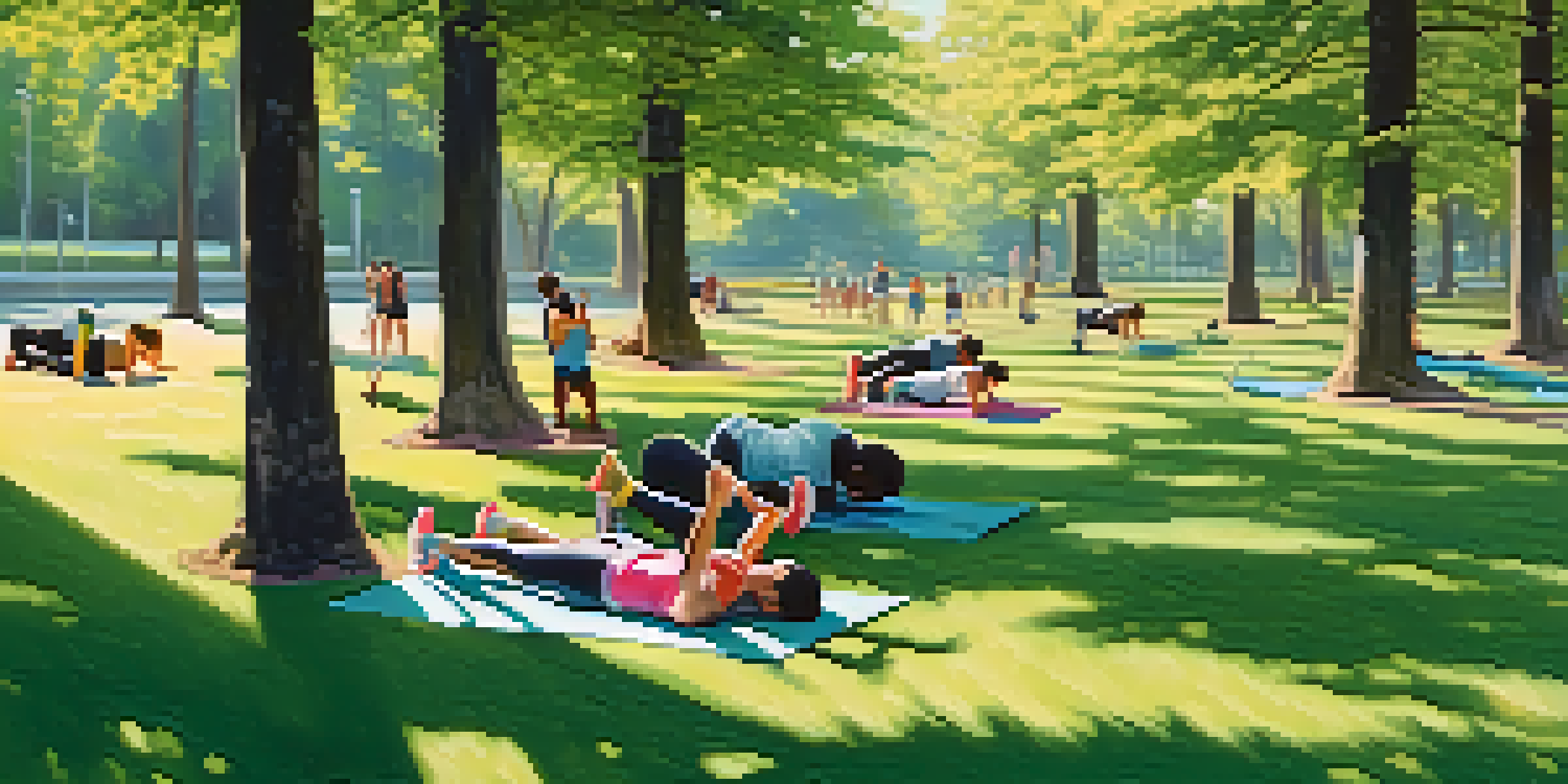Building Muscle with Just Your Bodyweight: A Beginner's Guide

Understanding Bodyweight Training: The Basics
Bodyweight training is a form of strength training that uses your own weight as resistance. It’s an accessible way to build muscle without the need for bulky gym equipment. This makes it perfect for beginners who want to get started on their fitness journey.
Strength does not come from the physical capacity. It comes from an indomitable will.
The beauty of bodyweight exercises lies in their versatility. You can do them almost anywhere – at home, in a park, or even while traveling. Plus, they can be modified to suit any fitness level, ensuring everyone can benefit from them.
As you progress, you can increase the intensity by adjusting the number of repetitions, the pace, or even the complexity of the movements. This keeps your workouts fresh and challenging, helping you to stay motivated and engaged.
The Benefits of Bodyweight Training for Muscle Growth
One major benefit of bodyweight training is that it builds functional strength. Unlike lifting weights, which can isolate specific muscles, bodyweight exercises often engage multiple muscle groups simultaneously. This not only promotes muscle growth but also improves coordination and balance.

Additionally, bodyweight exercises can be incredibly effective for hypertrophy, which is the increase in muscle size. Movements like push-ups, squats, and pull-ups target large muscle groups, leading to significant strength gains over time.
Bodyweight Training Basics Explained
Bodyweight training utilizes your own weight as resistance, making it accessible and versatile for all fitness levels.
Another advantage is that bodyweight training can enhance your overall fitness level. It improves endurance, flexibility, and cardiovascular health, making it a well-rounded approach to exercise.
Key Bodyweight Exercises to Start With
As a beginner, it's essential to start with foundational exercises that will set the stage for your muscle-building journey. Some key exercises include push-ups, squats, lunges, and planks. These movements target major muscle groups and help build strength progressively.
The difference between a successful person and others is not a lack of strength, not a lack of knowledge, but rather a lack in will.
Push-ups are fantastic for building upper body strength, focusing on the chest, shoulders, and triceps. Squats, on the other hand, engage the lower body, working the quads, hamstrings, and glutes. Incorporating these exercises into your routine will provide a solid muscle-building foundation.
Don't forget about variations! As you gain strength, you can modify these exercises to increase the challenge. For instance, try elevated push-ups or jump squats as you progress to keep your workouts engaging and effective.
Creating a Balanced Bodyweight Workout Routine
To build muscle effectively, it's crucial to design a balanced workout routine. Aim to include exercises that target all major muscle groups throughout the week. A typical routine might involve upper body, lower body, and core workouts, ensuring you develop strength evenly.
Consider the frequency of your workouts as well. Starting with two to three sessions per week is a great way to allow your body to adapt and recover. Gradually increase the intensity and frequency as you become more comfortable with the exercises.
Key Exercises for Beginners
Fundamental exercises like push-ups, squats, and lunges are essential for building a strong muscle foundation.
Also, don't forget the importance of rest days. Muscles grow during recovery, so ensure you give your body time to heal and rebuild. This will help you avoid injury and promote sustainable muscle growth.
Incorporating Progressions to Challenge Yourself
As you become more comfortable with bodyweight exercises, it's important to introduce progressions to continue building muscle. Progressions involve increasing the difficulty of an exercise to keep challenging your muscles. For example, if regular push-ups become too easy, try one-arm push-ups or archer push-ups.
Another way to progress is by manipulating the tempo of your movements. Slowing down the eccentric phase (the lowering part of the movement) can increase time under tension, which is great for muscle growth. Experimenting with different variations keeps your workouts exciting and effective.
Remember, the key is to listen to your body. If an exercise feels too challenging, focus on mastering the basics before moving on. This gradual approach ensures you build strength safely and sustainably.
Nutrition: Fueling Your Muscle-Building Journey
While bodyweight exercises are essential for building muscle, nutrition plays a vital role as well. Consuming a balanced diet rich in protein, healthy fats, and carbohydrates will provide the necessary fuel for your workouts and recovery. Aim for protein sources like lean meats, beans, and legumes to support muscle repair.
Hydration is equally important. Drinking enough water helps maintain optimal performance during your workouts and aids in recovery. Dehydration can hinder your strength gains, so keep a water bottle handy at all times.
Nutrition Fuels Muscle Growth
A balanced diet rich in protein and proper hydration is crucial for effective muscle repair and growth during bodyweight training.
Additionally, consider timing your meals around your workouts. Eating a small meal or snack containing protein and carbohydrates before and after your workout can enhance performance and recovery, helping you reach your muscle-building goals more effectively.
Staying Motivated on Your Bodyweight Training Journey
Motivation can sometimes wane, but finding ways to stay inspired is crucial for your success. Set realistic and achievable goals to keep your focus sharp. Whether it’s performing a certain number of push-ups or mastering a new exercise, having specific targets can boost your motivation.
Joining a community or finding a workout buddy can also help keep you accountable. Sharing your journey with others not only provides support but can also introduce you to new exercises and ideas to keep things interesting.

Lastly, celebrate your progress, no matter how small. Recognizing your achievements, whether it's an increase in reps or mastering a new move, will keep you motivated and remind you of how far you've come on your muscle-building journey.